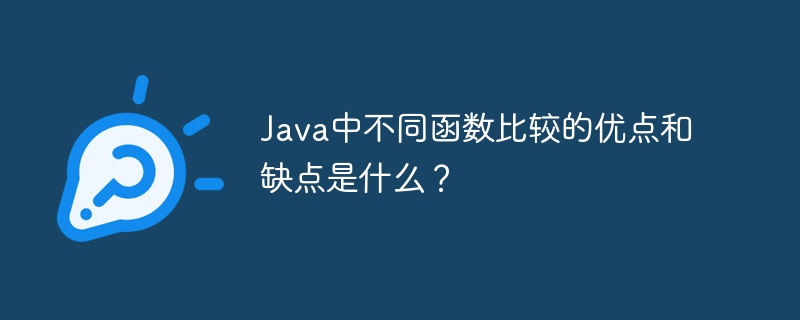 Java
Java
 javaTutorial
javaTutorial
 What are the advantages and disadvantages of comparing different functions in Java?
What are the advantages and disadvantages of comparing different functions in Java?
What are the advantages and disadvantages of comparing different functions in Java?
Functions that compare values in Java each have their own pros and cons. Basic type comparison operators (==/!=) are fast but cannot handle objects; equals() compares objects and null values, but is slower; compareTo() and compare() are used to compare objects, but only for objects that can be Comparing objects, or any type in Java 8, is also slower.

Advantages and Disadvantages of Comparison of Different Functions in Java
In Java, there are various functions that can be used to compare values. Each function has its own advantages and disadvantages, and understanding these differences is crucial to choosing the right approach.
== and != comparison operators
Advantages:
- Concise and easy to understand
- Optimized for basic types
Disadvantages:
- Unable to compare objects
- Cannot handle null values
equals() method
Advantages:
- can compare objects
- can handle null Value
- Allows custom comparison logic (by overriding)
Disadvantages:
- May require more code ( Especially when comparing multiple fields)
- For basic types, it is slower than comparison operators
compareTo() method
Advantages:
- Can be used to compare objects
- Can handle null values
- Returns an integer indicating the comparison result (-1, 0, 1 )
Disadvantages:
- Only applicable to comparable objects (that is, implementing the Comparable interface)
- For basic types , it is slower than the comparison operator
compare() method (Java 8)
Advantages:
- Similar to compareTo(), but can be used for any type
- Returns an integer indicating the comparison result (-1, 0, 1)
- You can use the Comparator interface to customize the comparison logic
Disadvantages:
- Only available in Java 8 and above
- For primitive types, it is slower than comparison operators
Practical case
Compare two strings:
1 2 3 4 5 6 7 8 |
|
Compare two numbers:
1 2 3 4 5 6 7 8 |
|
The above is the detailed content of What are the advantages and disadvantages of comparing different functions in Java?. For more information, please follow other related articles on the PHP Chinese website!

Hot AI Tools

Undresser.AI Undress
AI-powered app for creating realistic nude photos

AI Clothes Remover
Online AI tool for removing clothes from photos.

Undress AI Tool
Undress images for free

Clothoff.io
AI clothes remover

AI Hentai Generator
Generate AI Hentai for free.

Hot Article

Hot Tools

Notepad++7.3.1
Easy-to-use and free code editor

SublimeText3 Chinese version
Chinese version, very easy to use

Zend Studio 13.0.1
Powerful PHP integrated development environment

Dreamweaver CS6
Visual web development tools

SublimeText3 Mac version
God-level code editing software (SublimeText3)

Hot Topics
 1377
1377
 52
52
 Square Root in Java
Aug 30, 2024 pm 04:26 PM
Square Root in Java
Aug 30, 2024 pm 04:26 PM
Guide to Square Root in Java. Here we discuss how Square Root works in Java with example and its code implementation respectively.
 Perfect Number in Java
Aug 30, 2024 pm 04:28 PM
Perfect Number in Java
Aug 30, 2024 pm 04:28 PM
Guide to Perfect Number in Java. Here we discuss the Definition, How to check Perfect number in Java?, examples with code implementation.
 Random Number Generator in Java
Aug 30, 2024 pm 04:27 PM
Random Number Generator in Java
Aug 30, 2024 pm 04:27 PM
Guide to Random Number Generator in Java. Here we discuss Functions in Java with examples and two different Generators with ther examples.
 Weka in Java
Aug 30, 2024 pm 04:28 PM
Weka in Java
Aug 30, 2024 pm 04:28 PM
Guide to Weka in Java. Here we discuss the Introduction, how to use weka java, the type of platform, and advantages with examples.
 Smith Number in Java
Aug 30, 2024 pm 04:28 PM
Smith Number in Java
Aug 30, 2024 pm 04:28 PM
Guide to Smith Number in Java. Here we discuss the Definition, How to check smith number in Java? example with code implementation.
 Java Spring Interview Questions
Aug 30, 2024 pm 04:29 PM
Java Spring Interview Questions
Aug 30, 2024 pm 04:29 PM
In this article, we have kept the most asked Java Spring Interview Questions with their detailed answers. So that you can crack the interview.
 Break or return from Java 8 stream forEach?
Feb 07, 2025 pm 12:09 PM
Break or return from Java 8 stream forEach?
Feb 07, 2025 pm 12:09 PM
Java 8 introduces the Stream API, providing a powerful and expressive way to process data collections. However, a common question when using Stream is: How to break or return from a forEach operation? Traditional loops allow for early interruption or return, but Stream's forEach method does not directly support this method. This article will explain the reasons and explore alternative methods for implementing premature termination in Stream processing systems. Further reading: Java Stream API improvements Understand Stream forEach The forEach method is a terminal operation that performs one operation on each element in the Stream. Its design intention is
 TimeStamp to Date in Java
Aug 30, 2024 pm 04:28 PM
TimeStamp to Date in Java
Aug 30, 2024 pm 04:28 PM
Guide to TimeStamp to Date in Java. Here we also discuss the introduction and how to convert timestamp to date in java along with examples.



